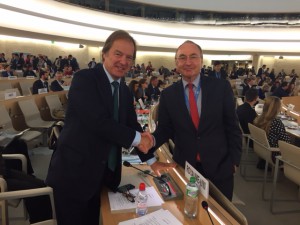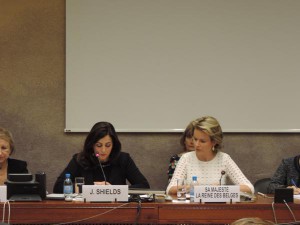16th September 2015 Geneva, Switzerland
Turning 30

I hope you had a good break. Those wise enough to spend their holidays in or around these parts will be coming back to the Council re-energised from the unusually long hot summer we’ve had this year. To my family’s bemusement, I opted to spend our holidays caravanning in the slightly more inclement weather which the north of England has to offer in August. The sun did put in an appearance one day, bringing the temperature beyond the mid teens though it didn’t quite make it to room temperature. But by that point most of us already had colds, coughs and other English summer ailments. I suspect I won’t be put in charge of the holiday planning again anytime soon.
It’s never easy getting down to Council business after the summer and the week before the Council had an awkwardly placed public holiday, just to add an extra dose of chaos. For those of us about to abandon our families to Council Wonderland, it was a chance to do some pressing domestic tasks like ironing our shirts, mowing the lawn, and fixing the lights. Or in my case, putting my non-iron shirts in the dryer, trimming the moss outside and narrowly avoiding electrocution while tampering with sockets. To my family’s relief I’m sticking to resolutions for the next few weeks.

As someone who’s been around from the Council’s birth, I’m struggling to come to terms with the fact that the Council entered its 30s on Monday. While this only equates to nine and ¾ actual years, Council sessions often feel like they age you by more than a decade when you’re stuck in the middle of one, which makes me almost 340. Like most 30-somethings the Council now seems to have got over the existential angst of its teenage years and has a seriousness of purpose about its work. But it clearly still has much more to do to leave a lasting legacy, especially in responding to some of the gravest violations of human rights around the world.
The session began with an emotional statement by High Commissioner Zeid who spoke movingly about Aylan Al Kurdi whose death has brought so many of us first to tears and now to seek greater action to try to alleviate the suffering in Syria. Zeid said after a year in office he was exhausted and angry – exhausted because the human rights system lacks the resources to cope with the seemingly overwhelming challenges the world now faces and angry that so little we say seems to change this. He was particularly critical of Syria’s violation of “every principle of human rights” and said such “vicious violence bites deeply into the sense of community that underpins peace and well being in our world”. Zeid was also especially critical of the increase in use of restrictive legislation across the world to suppress civil society and singled out China and Russia for particular rebuke.
As for many colleagues, it’s been a busy start for the UK team. Foreign Office Minister Hugo Swire came on the first day to address the Council and meet senior figures around Geneva to discuss Syria, Sri Lanka, North Korea and other matters which are set to loom large this session. His trip here coincided with a visit by Sri Lanka Foreign reminders Mangala Samaraweera, who he met. All eyes are on Sri Lanka this session with the UN High Commissioner about to publish his investigation into violations in the final stages and aftermath of the Sri Lankan conflict . Foreign Minister Mangala announced a range of encouraging commitments which would move his country forward on the path of truth and reconciliation if they become reality. It was heartening to see such a high level of engagement by Sri Lanka after so many wasted years of antagonism and hostility. But much will hinge on the type of justice mechanism Sri Lanka sets up, with many convinced that any judicial process must have a strong international component if it is to be seen as credible both within and outside the country.

A second UK Minister, Baroness Shields who leads for the UK on Internet safety and security, followed hot on the heels of Mr Swire. She joined the Queen of Belgium at a Council event on protecting children from sexual violence online – a topic on which the UK has been very active following the (hyperlink) weProtect summit last December. Both Ministers made a very good impression on those they met and it was good having them here.

I wish you all a good session, whatever it is you’re covering. With 40 resolutions expected it’s going to be busy a one. With a bit of luck it won’t be all work though – I’m planning a brief escape this weekend to help ease some friends from back home into their 40s. Meanwhile, my wife is taking advantage of my absence to call in an electrician or anyone who can get within the proximity of a light without blowing all our fuses.